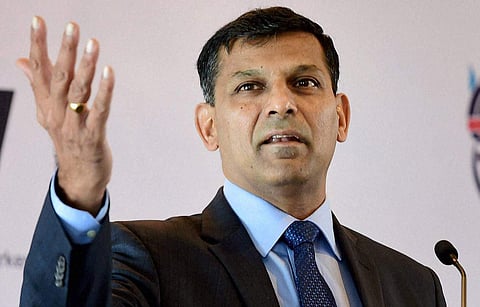

Most economists don’t agree with what former Reserve Bank of India (RBI) Governor Raghuram Rajan said about the state of the Indian economy. According to them, instead of looking at quarterly numbers, economic growth should be looked at on an annual basis.
Rajan in his recent interview with the new agency Press Trust of India (PTI) said, “India is dangerously close to Hindu rate of growth”. The term “Hindu rate of growth” was coined by economist Raj Krishna in 1978, which he used to denote the GDP growth at nearly 4 per cent from the 1950s to the 1980s.
“The latest October-December Indian GDP numbers suggest slowing growth from the heady numbers in the first half of the year... The RBI projects an even lower 4.2 per cent for the last quarter of this fiscal," Raghuram Rajan was quoted as saying in the PTI report. His statement came after the National Statistical Office’s report showed a sequential slowdown in the latest estimate of national income.
GDP growth in the October-December quarter of FY23 stood at 4.4%, sharply down from 6.3% recorded in the previous quarter on account of low private consumption expenditure and contraction in the manufacturing sector. NSO has retained the projection of 7% growth in FY23 in its second advance estimates also. The economic growth is projected to slow to 6.5% in FY 24, as per NSO.
“When we look at economic growth, we should look from an annual growth basis and not from quarterly numbers. Talking about annual numbers, we are speaking of a 7% growth rate for the current fiscal year, 6.5% for next year, so it is definitely not a stagnant rate of growth like 3 or 3.5%, which we had 30-40 years after independence. Even if we look at quarterly growth rates, RBI data shows that they will be higher next year. So statistically speaking, that India is anywhere close to Hindu rate of growth is not right,” Madan Sabnavis, Chief Economist, Bank of Baroda said.
“Rajan made a blanket statement that private investment is not happening at all. Actually, it is not broad-based but it is happening in infrastructure-related industries. It is not happening in the consumer-oriented industries,” he said while countering Rajan’s viewpoint.
Meanwhile, Madhavi Arora, Lead Economist at Emkay Global Financial Services echoed the same and said, “There are possible economic agents like consumption, investments and exports, which can take India’s growth story to 8%. On a structural basis, to say that we are going towards 3.5% growth is a bit of a stretch.”
However, Arun Kumar, economist and former professor at Delhi’s Jawaharlal Nehru University agreed with Rajan on his views on the slowing economy. He said, “Indian economy has been going up and down. There is no fixed rate of growth. There is nothing like a “Hindu” rate of growth. It is a bit of a misnomer to say that it is going back to the Hindu rate of growth. What is true is that the rate of growth started declining even before the Covid pandemic. It is happening because of the massive inequality with 94% of people working in the unorganized sector. RBI data shows that capacity utilization is hovering around 70-72%, that’s why consumption and investment are low. That’s why the rate of growth is low.”
“Organized sector in India is expanding at the cost of the unorganized sector which is a major cause of concern. The growth rate will rise only if the demand in the unorganized sector picks up. The unorganized sector is unable to grow because of unemployment and low income. Demonetization and GST hit this sector hard and they have not been able to cope with both these disruptions.” Kumar added.